#atla critical
Text
The Fortune in The Fortune Teller
This is an isolated look into this specific episode.
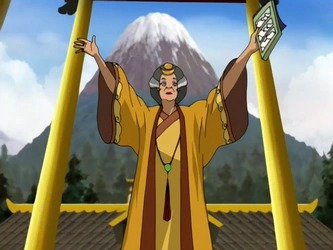
The Fortune Teller is the 14th episode of book 1 of Avatar: The Last Airbender. It is famous for supposedly developping the show's romantic subplot between Katara and A\ang. The episode does two things: A\ang attempts to flirt with Katara, and Katara is finally willing to consider him as more than just a friend.
However, I believe that this episode could have masterfully foreshadowed the pair not getting together in the end. In this essay I will detail how each step the episode takes towards a Kat@ang endgame is actually foreshadowing the opposite.
1. Katara and the Nature of Destiny
In the beginning, the Gaang meets a person getting attacked by a bear. He is acting incredibly passive, simply dodging the bear's attemps at his life. Then, A\ang and Appa interfere to help the man. When the Gaang questions him on why he was so passive, he says it's because the Fortune Teller told him he'd have a safe journey. They then have the following exchange:
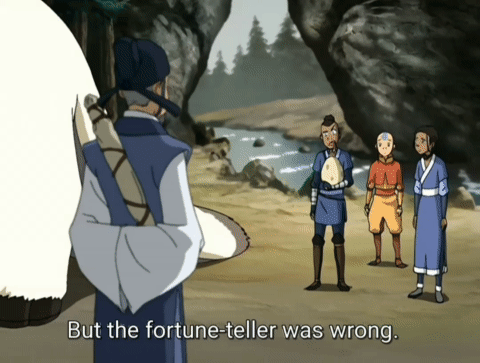
The man's logic is obviously flawed. If the Gaang didn't interfere, if the man continued to passivaly dodge, the bear would have attacked him. Fortune and destiny come from agency – from actively shaping them.
However, Katara is delaited at the prospect of seeing the future. Her and the Gaang go to meet the Fortune Teller, Aunt Wu. Aunt Wu tells her she'll marry a very powerful bender. Later, she comes back asking more details about her future husband. Remember her excitment, fantacising about her future husband:
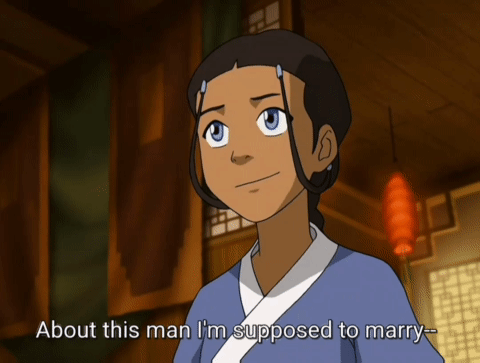
After that, Katara becomes somewhat reliant on Aunt Wu's prophecies. She goes as far as to ask her what she should eat.
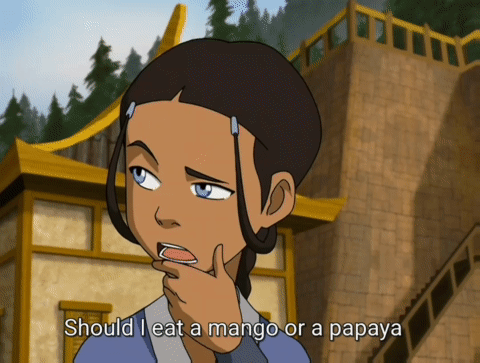
And she obeys her "prophecy", despite not wanting to. She became like the man from the beginning. She knowingly follows the fortune even though it doesn't make sense. She had given up on forging her own destiny.
Although by the end of the episode, she is no longer in this state of reliance, she still believes in the prophecies. Then, Sokka says that A\ang is a very powerful bender. This reminds her of what Aunt Wu said about her future husband. I don't want to cherry pick, so I took 4 different pictures of her face when she realizes A\ang might be the powerful bender she is to marry:
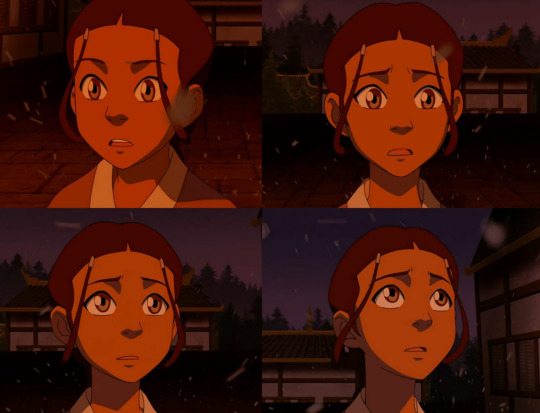
With the look in her eyes, with her mouth tilted down and with the ominous music, this could easily be read as disappointment. Especially when remembering how she fantacized about the powerful bender earlier in the episode. She doesn't smile, but looks concerned. As if she doesn't want this. Earlier in the episode, she says this:
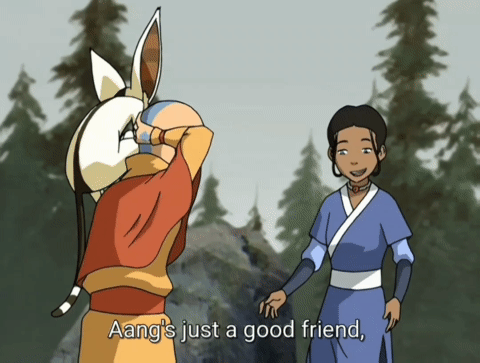
A\ang is like the papaya. The fortune says he's right for her, but Katara doesn't want him. Now, she isn't like the man, passively dodging the bear attacking her. She shouldn't sit and wait for the prophecy to come true point blank. She has the agency to shape her own destiny and not to choose A\ang as her future husband.
2. A\ang, Meng, and First Crushes
In this episode we're introduced to a girl named Meng. Aunt Wu told her she'd end up with someone like A\ang, and so she developped a one sided crush on him. Throughout the episode she attempts to talk to him, all to no avail. Because A\ang is not interested in her.
Interestingly, her one sided crush is directly paralleled to A\ang's crush on Katara.
Exhibit A:
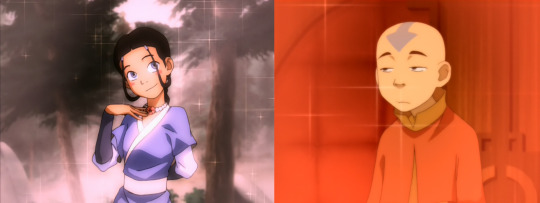
Exhibit B:
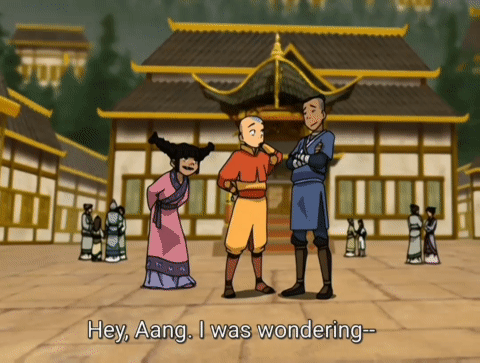
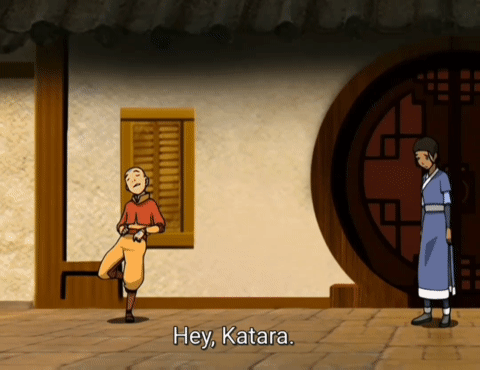
Exhibit C:
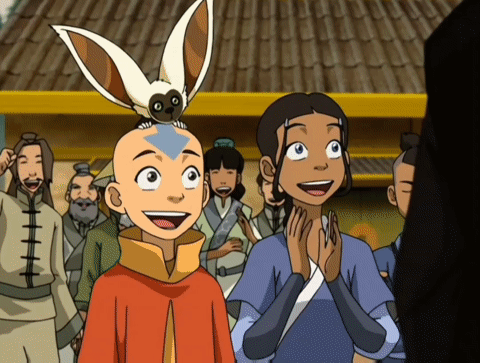
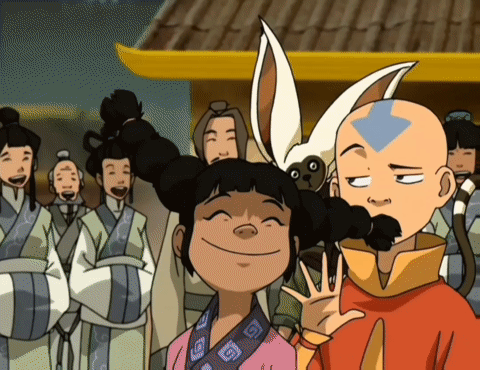
Please note that in exhibits B and C in particular, there is an emphasis on the other party not reciprocating their feelings.
In this parallel the show draws, A\ang is Meng, the younger, shorter one the one who is in love; and Katara is A\ang, the older, taller one who... *checks notes*... doesn't reciprocate.
But in the end, A\ang and Meng have a heart-to-heart.
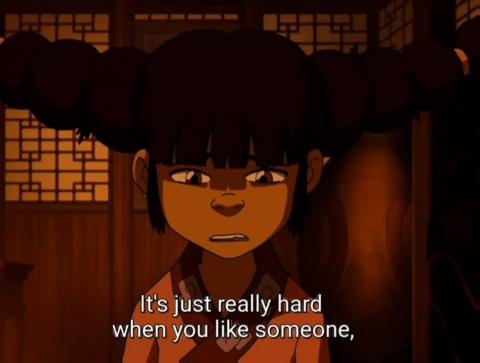
Sometimes you'll like someone, and they aren't going to feel the same way, and even though it's hard, it's okay. They're young, just kids having a crush. A\ang responds to this with "I know what you mean". Because he, just like the audience that watched the parallels, knows that Katara likely doesn't return his feelings.
———————
In conclusion, The Fortuneteller could have been brilliant foreshadowing to Kata\ang not being the endgame couple, and it would have done so through beautiful, mature lessons about first loves and destiny. Thank you for reading.
#anti kataang#zutara#atla critical#anti anti zutara#pro zutara#zutara analysis#zutara evidence#zutara forever#zutara meta#zutara nation#zutara should have been canon#zutar#zutara supremacy#zuko x katara#katara x zuko#katara#meng
57 notes
·
View notes
Text
literally pleased with almost all of the new atla trailer except as per usual, Zuko's scar, idk why studios are so scared to commit to the intensity of the thing, its supposed to be shocking and obvious and textured and the first thing you see... that's the point, Zuko is supposed to struggle with feeling like it defines and brands him before finally coming to the point in his journey where he defines it.
Hollywood/big studios are known to hesitate or straight up avoid properly and honestly and unapologetically showing people with disfigurements/disabilities/facial differences etc. with the realism they deserve. Which is a shame in general for representation and humanization but ESPECIALLY in this case as its minimization actively harms it's narrative purpose as well
I promise making the scar more intense (shrivel up the ear a bit, make it intrude in his hairline, make his eye in a permanent squint due to nerve damage, for god sake REMOVE THE EYEBROW IT WAS BURNED OFF) will not make Zuko "ugly", (the actor is incapable of looking ugly and also the implication that scars make people too unappealing? yikes) but will actually do the character and his journey justice, not to mention really show Ozai's brutality, another essential narrative tool. Especially when he's bald like hello??? It should be even more stark and intense when he doesn't have hair to distract from it and cover his ear!!!
When transitioning from 2D to live action, of course some visuals are up for interpretation but that usually involved ADDING detail because the constraints of having to stay on modeling frame to frame is gone, not minimizing, removing or airbrushing. Doing Zuko's scar right to me is absolutely essential and I'm disappointed they seem just as as scared to go there as I thought they might. It doesn't have to be gory, if you've ever seen burn victims in real life or in pictures or even cosplayers/artists who are skilled in realistic burn makeup you'd know its possible to balance realism with humanity. It's possible especially with their resources to avoid the "scary Halloween makeup" route while not holding back on the brutality of the original injury.
Budget is definitely not an issue, or "scaring the kids" considering this remake is likely aiming to go a lil darker in tone than the cartoon (which was already super dark with its target audience of nickelodeon 7 year olds so no excuses) Audiences SHOULD be unsettled and upset when they see him but not because he's hard/disturbing to look at but because we are human and do not want to imagine someone doing that to a child.
It's a deliberate choice out of the all too common fear/hesitation to allow someone who is destined to eventually become a protagonist and is meant to be sympathized with to be "too ugly" while this hesitation is very rarely applied to straight up villains (again we come back to media's historic villainization of facial deformity). It's a trend that's always ticked me off in fanart too. The boy's face was melted, for gods sake. Zuko was always portrayed as an attractive boy in the cartoon (fire nation girls fawn over him) even with the intensity of his scar which is something I've always admired! People exist with scars similar to Zuko's in real life, and should not only be permitted to be represented as good guys and/or as attractive when their scars are toned down to be "palatable"
Like I said there's more that I loved than didn't love about the trailer, that can be a whole essay on it's own but I needed to get this very specific vent off my chest because it missed the mark so hard and stands out like a sore thumb in comparison to all the other visuals that hit the nail on the head to me
#atla#zuko#avatar the last airbender#atla live action#ozai#dallas liu#my posts#atla wank#rant#atla critical#prince zuko#netflix#netflix atla
3K notes
·
View notes
Text
It’s really funny how much people misremember certain aspects of ATLA and then proclaim to the internet stuff that either never happened or is extremely distorted with absolute certainty. For example, today I saw a person claiming that whole point of Katara’s character arc was unlearning the parentified behaviours she developed in wake of her mother’s death. That a huge part of Katara’s arc was a confrontation of how that trauma fundamentally shaped her maternal tendencies.
The thing is though…WE the audience, can recognize that the parentification Katara experienced was something that was really straining for her, but the TEXT doesn’t. The audience (or at least certain parts of the audience) can identify that her maternal tendencies were indicative of a responsibility that she took on far too young and subjected her to unnecessary pressure and stress. There are flashes of recognition maybe, but for the most part, the show doesn’t actually confront the negative impact that Katara’s maternal role had on her.
Katara never truly unlearns the maternal behaviours that put so much pressure on her because the text doesn’t see it as a bad thing. Arguably, the text doesn’t see much of a problem with the emotional labour Katara takes on and how that labour goes unreciprocated for the most part (particularly from her canon love interest). We see some reflections, but it’s not enough to support a reading of the text where that element is actually extremely obvious and a prominent point in her character arc.
We’re not the ones “watching the show with our eyes closed”, I think you’re just misremembering the canon progression of Katara’s arc to avoid confronting a real issue in the text.
#Katara#pro katara#avatar the last airbender#atla fandom critical#atla discourse#the gaang#character analysis#atla fandom discourse#zutara#atla critical#anti bryke
426 notes
·
View notes
Text

I usually try to write neutral captions for my ATLA drawings, but this time I want to share my disappointment with this cartoon.
At first it was supposed to be a slight redesign of Katara from book 3. I don't really like her blue dress from there, and I tried to draw certain elements differently to understand what exactly bothered me. I like the result, especially her sleeves and the fabric on her arms. I also wanted to draw a crescent moon on her forehead because book 3 forgot that the Water Tribe paints their faces before battle. I wanted to give Katara something related to her personal experience, so imho she would have a crescent moon on her forehead in the invasion.
And then I started thinking about her hair (I ended up using the hairstyle from this post). It always confused me that in the first episode of season 3 Katara had her signature braid, because she lost her clips at the end of season 2. Where did the new ones come from? Does she have a whole set of spare ones? Or did father give it to her? I don’t understand, so I think that her hairstyle in book 3 could be completely different from the look we are used to.
Then I asked myself: what would she look like in the first episode if her hairstyle had been changed? You can see the answer for yourself. Frayed curls, an almost untied bun, a tired look… This is how I felt about Katara at the beginning of the season and… I was furious.
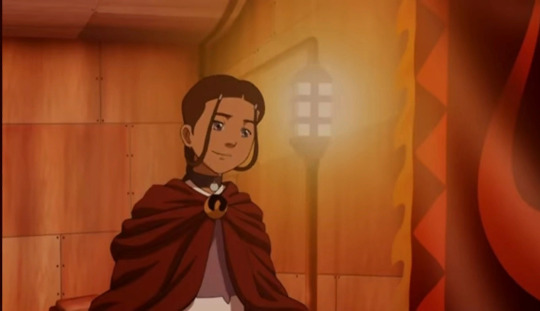
Why doesn't she look like this? Why wasn't she allowed to show her fatigue? Yes, her clothes are still torn and unkempt, but neither her face nor her hair reflect her condition, why? Were the authors afraid to show that Katara also has limits?
Girls are not required to look beautiful and well-groomed, especially when they are tired. It makes me so angry that after her witnessing the death of a dear friend, escaping on a ship, caring for a sick boy for a long time, and then his screaming and running away, Katara looks the same as always. She is not tired, she is still ready to support the main character and run to the ends of the earth for him.
?!??!
But ok, maybe this is just the beginning, and we'll be shown reaching Katara's limits in the next episo-
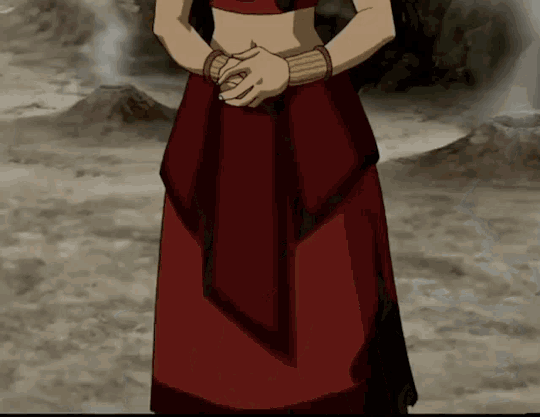
…
Oh, she is now completely neat and well-groomed so that the boy can admire her beauty…
It doesn't sound very good, to be honest. I don’t want to insult the ship or the main character, we’re not talking about them now. I'm talking about the very message where the girl is beautiful and mentally stable when it is convenient for the boy. That is, imagine if Katara looked at that moment about the same as in my drawing. Would he like her in this state? I don't know, because I haven't seen Aang admire Katara beyond the peak of her beauty. Also, I didn’t see him admiring her with disheveled hair, for example, or in action scenes. It’s not that it’s the characters’ fault, but rather that the authors rarely allow Katara herself to be like this, especially at the end of the adventure, where she clearly has little moral strength.
Feels like the message is that in a man's eyes, a woman is only beautiful when she dresses up and hides her flaws. As if fatigue is something that needs to be hidden behind a sweet smile and a beautiful outfit.
Maybe I'm not right. Please don't take my words as an insult to something you enjoy, but that is my interpretation of what is happening. This is a problem for me, because the topic of female fatigue in my eyes is as important as female strength. And if the series shows Katara's strength, it seems to ignore her fatigue.
This is just an opinion, I don't claim anything.
#atla#avatar: the last airbender#atla fanart#atla critical#katara#atla katara#katara meta#katara's fatigue#I only remember two episodes dedicated to Katara's fatigue and her moral boundaries#This is “The Desert” and “The Southern Raiders”#A man needs his rest#and Katara is no exception
505 notes
·
View notes
Text
I think Aang should have been separated from his friends in "The Desert" episode.
He ran off to find Appa, and flew so far away that he couldn't return to his friends. And Katara led the others out of the desert, unable to look for Aang.
Thus, their branches would split into two: Aang would search for Appa, following in his footsteps, and the rest would head to Ba Sing Se, hoping to meet Aang there.
The fact is that Aang doesn't play a role in the plot in Ba Sing Se. The main characters entered the palace thanks to Toph and her knowledges, they got to Lake Laogai thanks to Katara's healing abilities and Jet, and diplomatic negotiations were entirely carried out by Sokka. Aang only created a zoo here in the filler, he didn’t influence anything else, so I would make a separate arc for him so that he wouldn’t be useless.
Since Appa was seeing Guru Pathik, Aang found him earlier, following his friend's footsteps. And he stayed to study the state of the avatar not for half a series, but for several, thereby showing that opening the chakras requires time and effort.
And when Aang reached the last chakra, he could feel Appa at Lake Laogai because they have a special mental connection. And, without wasting a second, he went to save his friend from shackles and torture.
In the finale, Aang would meet with his friends, but without Katara, because she was caught and imprisoned in the catacombs along with Zuko. And now all roads lead to the caves, where Azula, Zuko, Katara and Aang will meet in the final battle.
In this case, I would also expand the imprisonment of Katara and Zuko, making a mini arc out of it. Katara doesn't wait for Aang to save her and tries to find a way out herself. However, she needs to work together with Zuko, and together they would build a relationship not only through dialogue, but also by working together.
They would have to rely on each other to get out, which requires trust. And in the end, when they had overcome several cave obstacles and had even become friends, Zuko would have betrayed their mutual trust, thereby truly hurting his newfound friend.
This teamwork would also explain why Katara and Zuko later work so well together, since they would have already laid the groundwork for this here...
#atla#avatar the last airbender#zuko#atla zuko#prince zuko#katara#atla katara#aang#atla aang#the desert#atla critical
422 notes
·
View notes
Text
it's pretty wild to me that people don't see that aang running off to save katara in CoD is his luke in empire strikes back moment, where he runs headlong into his want and attachment and he's narratively punished for doing so and not learning his lesson - aang runs after katara despite guru pathik's warning, like luke runs after leia and han from yoda on dagobah despite yoda's warning; similarly, as a result, things go to hell in ba sing se like they do on bespin - aang enters the avatar state before he's ready and gets killed, and ba sing se falls to the fire nation, luke fights vader before he's ready, loses a hand, and symbolically commits suicide after vader tells him he's luke's father.
the difference between their character arcs is that george lucas and co. actually went thru with luke's hero's journey and understood the fundamental difference between attachment and love, whereas I don't think bryke understood this difference and then dropped this from aang's arc pretty much completely and replaced it with aang digging in his heels into his want and attachment and he gets rewarded with energy bending from a lion turtle, the avatar state from a random pointy rock, and his forever girl from the self-indulgent white men that couldn't bring themselves to give their hero a compelling character arc that meant he might not have gotten everything he wanted at the end.
#the wasted potential of aang's arc gets to me so bad#the narrative and thematic set up is entirely there and they just shove it in the bin lmao#it especially irks as someone raised buddhist and dealing with writers that invoke these themes out of a fascination#with the religion and philosophy but then a complete unwillingess to actually commit to what those themes require of the character arcs#anyway sorry to say it#but zuko's arc does a better job embodying buddhist themes than aang's does in the end#despite all misappropriated aesthetics to the contrary#aang critical#but its really the writing like i LIKE aang i love his potential i hate how self indulgently he's written by the end of the show#atla critical#meta*#holly talks bs#also yes it would've been better narratively for aang katara zuko to the go the way of luke leia han#even if katara couldn't have been revealed as aang's surprise secret twin lmao#the thematic conceit of the triangle is the same in that luke and aang get over their infatuation with the first pretty girl he sees#and becomes the hero he needs to be#meanwhile hanleia and zutara are saving each other and being cool and kissing#anyway
310 notes
·
View notes
Text
It's common knowledge that Zuko and Aang, throughout the duration of ATLA, are a mirror of one another; a reflection of each other - not necessarily opposites but parallels.
So whilst I was analyzing the finale of the show, I noticed a really interesting parallel between our two protagonists:
Zuko was close to dying in his final confrontation with Azula and what pulled him back up, what saved him from dying was water. More necessarily Katara's healing abilities - but nonetheless, his opposing element saved his life.
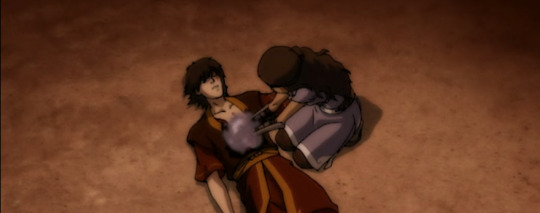
On the other hand, Aang throughout his harrowing fight against Ozai utilizes Earthbending time and time again to save himself, techniques that we've come to associate with Toph (rock armor and seismic sense). And to access the Avatar State, that had since been blocked, Earth had been the ultimate catalyst to unlocking his Seventh Chakra.
And if we take into consideration what Guru Pathik told Aang - to unlock the Seventh Chakra he would have to let go of Katara. In a sense, this could have been a visual representation of how Aang lets go of his love for Katara, and how Toph (Earth) could take up that role.
Earth, his opposing Element, saves his life.
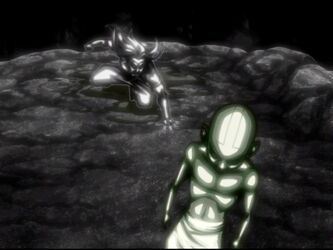
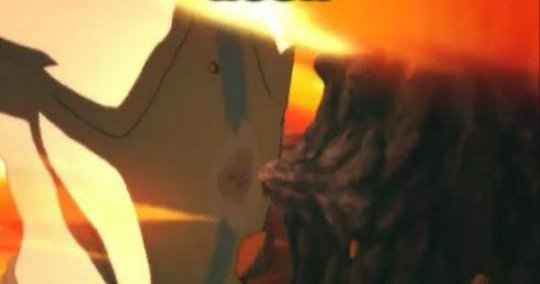
It's also interesting that our protagonists' conclusions and destinies are integrally tied to the aforementioned girls. Destiny and Fate are two major themes in ATLA, alonside the moral lesson shared to us by Uncle Iroh about the unity of the four elements and how each element can learn and grow from the other.
Zuko's destiny to bring honor to Fire Nation whilst also challenging his conflicting natures (Sozin vs. Roku; Ozai/Azula vs. Iroh) would have never come into fruition had it not been for Katara. Katara was the first person (other than his Uncle) to show him genuine compassion and humanity, she was the first person to glimpse into his true, kind and gentle nature. Additionally, had she not fought alongside Zuko to defeat Azula and save his life, he would have never been able to step up to the Throne and fulfill his destiny. Thus Katara is linked and bound to Zuko's destiny.
Aang's destiny was to restore peace to the world and end The One Hundred Year War. The Aang we meet during Book One - is timid and soft, a strong bender and with limitless potential, but he lacked the confidence, the back-bone, the grounding to step-up to his duties as the Avatar and defeat Ozai. Katara coddled him and never challenged him to look beyond himself. It's only after meeting Toph does Aang begin to confront his opponents with a different viewpoint, he gains a certain matureness in himself and suddenly we see him step up into his role and responsibilities. Toph's Earthbending not only saves him from death but it also gave him the strength to face his destiny. Thus, Toph is linked and bound to Aang's destiny.
It would have tied a lot of unexplored themes as well as provide a more satisfying conclusion (Aang entering the Avatar State because he followed through with Guru Pathik's lessons instead of pointy rock triggers it) and it would have been cohesive with the narrative thematic of ATLA.
I'm still astonished at how badly Bryke fumbled the bag with their romantic sub-plots. 🗿
#toph beifong#taang#aang x toph#anti bryke#anti kataang#atla aang#toph x aang#katara#zuko#zutara#atla critical
1K notes
·
View notes
Text
Let's Talk About How Book 3 Ruined Aang
If you've seen any of my prior ATLA posts, you know that I don't hate Aang. In fact, I quite liked him in Books 1 and 2. He was flawed, as all characters should be, but the show didn't shy away from those flaws or justify them. He was called out for burning Katara and rushing his firebending, Sokka and Katara were rightfully upset when he hid Hakoda's letter, he willingly owns up to the fact that his actions helped drive Toph away, and his entire arc after losing Appa and finding hope again in The Serpent's Path was beautifully done.
(Hell, even in The Great Divide Katara says what Aang did was wrong and he agrees. It's played for comedy, but the show still makes the effort to point out that what he did wasn't the right thing to do. You're just meant to understand that he was fed up and acted off of that)
Those flaws and mistakes were addressed and improved upon and helped Aang to grow as a character.
But for some reason, that aspect of Aang's character was completely flipped in Book 3.
The best examples of this are in both TDBS and EIP. Both the show and the fandom are too quick to brush off that Aang kissed Katara twice without her consent, one of which after she explicitly said she was confused about her feelings.
(And yes, she is angry in response and Aang calls himself an idiot. But after this, it isn't really addressed. They go on like nothing happened for the rest of the episode. Aang's lamentation comes from screwing things up with her romantically, not that he violated boundaries)
The show never really addressed why what he did was wrong. Not only because he wasn't given consent, but also because both times he isn't thinking about what Katara wants. In both instances, Aang is only thinking about himself and his feelings. This is something that persists through a lot of the third book. And by Sozin's Comet it ultimately ruins any character development he had built up in the second book.
One thing I feel was completely disregarded was the concept of having to let go of Katara in order to master the Avatar State.
For me, the implication wasn't that he had to give up love or happiness necessarily. He was emotionally attached to and reliant on Katara, to the point where she was needed to stop him from hurting everyone around him and himself. This is obviously detrimental to his functionality as the Avatar. And the point of him "letting her go" wasn't that he had to stop caring about her, it was that his emotional dependency on her was stopping him from being the Avatar he needed to be and that was what needed to be fixed. I don't even think it's about the Avatar State itself, it's about being able to keep your emotions and duty as the Avatar separate.
(If you look at Roku, he loved and had a wife. It wasn't his love for her that messed everything up, it was his attachment to Sozin. He wasn't able to let Sozin go and not only did he lose his life for it, the world suffered for it. It's the unhealthy attachments that seem to be detrimental, not love itself)
And Aang realizes that in the catacombs, which is how he's able to easily enter the Avatar State and seemingly control it. He let Katara go.
So then why does it seem like his attachment to Katara is not only stronger, but worse in mannerism? He liked Katara in Books 1 and 2- obviously- but he was never overly jealous of Jet or Haru. He only makes one harmless comment in Book 2 when Sokka suggests Katara kiss Jet.
But suddenly he's insanely jealous of Zuko (to the point of getting frustrated with Katara over it), off the basis of the actions of actors in a clearly misrepresentative play. Katara showed a lot more interest in Jet and Aang was completely fine with it.
(Speaking of EIP, Aang's reaction to being played by a woman was interesting. He wore a flower crown in The Cave of Two Lovers. He wove Katara a flower necklace. He wore Kyoshi's clothes and makeup and made a funny girl voice. He willingly responded to Twinkle Toes and had no issue being called that. And for some reason he's genuinely upset about being played by a woman? Aang in Books 1 and 2 would have laughed and enjoyed the show like Toph did. His aversion to feminity felt vastly out of character)
I guess my point is, why did that change? Why was Aang letting go of Katara suddenly irrelevant to the Avatar State? It felt like him letting go was supposed to be a major part of his development. Why did that stop?
Myself and many others have talked about The Southern Raiders. The jist of my thought process about it is his assumption that he knew what was best for Katara. And the episode doesn't really call out why he was wrong. Maybe sparing Yon Rha was better for Katara, maybe it wasn't (the only one who's allowed to make that choice is her). Pushing forgiveness? That was wrong. But the episode has Zuko say that Aang was right when the course of action Katara took wasn't what Aang suggested.
Katara's lesson here was that killing him wouldn't bring back her mother or mend the pain she was going through and that Yon Rha wasn't worth the effort. That's what she realizes. Not that she needed to embrace forgiveness. How could she ever forgive that? The episode saying Aang was right wasn't true. Yes she forgives Zuko, but that wasn't what Aang was talking about. He was specifically talking about Yon Rha.
And that was wrong. Aang can choose the path of forgiveness, that's fine. That's his choice. But dismissing Katara's trauma in favor of his morals and upbringing wasn't okay.
I know it sounds like this is just bashing Kataang. But it's not simply because I don't like Kataang, in my opinion it brings down Aang's character too, not just Katara's. But let's steer away from Kataang and Katara for a minute.
The one thing that solidifies Aang's character being ruined in Book 3 for me is the fact that he- at the end of the story- does the same thing he did in the beginning.
He runs away when things get hard.
Aang couldn't make the choice between his duty and his morals. So he ran. Maybe it wasn't intentional, but subconsciously he wanted an out. And this is really disappointing when one of the things he was firm about in Book 2 was not running anymore. His character went backwards here and that's not even getting into the real issue in Sozin's Comet.
There's been contention about the Lion Turtle intervention. For many- including myself- it's very deus ex machina to save Aang from having to make a hard decision. And that in turn doesn't reflect kindly on his character.
Everyone- Sokka, Zuko, Roku, Kyoshi, Kuruk, and Yangchen (who was another Airbender and was raised with the same beliefs he was and would understand which was the whole point of him talking to her)- told him he had to kill Ozai. They all told him it was the only way. And he refused to listen to any of them, rotating through his past lives until he was given the answer he wanted.
And before anyone says that I'm bashing Aang for following his culture, I'm not. Ending the war peacefully, in my opinion, wasn't the problem. In a way, I think it allowed the world to heal properly. However, that doesn't make up for the fact that Aang refused to make a choice and face the consequences of that choice. Instead, he's given an out at the very last second.
Even if he couldn't kill Ozai and someone else had to deliver the final blow, that would have been better than the Lion Turtle showing up and giving him a power no one's ever had before. It would have been a good compromise, he doesn't have to have blood directly on his hands but what needs to be done needs to still get done. It would also show that being the Avatar isn't a burden he has to bear alone. That when things get hard, he can't run away but he can rely on the people closest to him to help him through hard decisions.
All these issues aren't necessarily a problem with Aang. Aang prior to Book 3 didn't have most of these problems. This is a problem with the way he was handled
#aang critical#anti aang#tagging just in case#i don't want aang stans accusing me of cross tagging#it's really not anti aang tho#long post#anti bryke#this is their fault#look how they massacred my boy#anti kataang#katara deserved better#she's not the focus here#but i thought I'd add that there#character analysis#atla critical#anti book 3#which is kind of an exaggeration#because a lot of book 3 is great#it's just most of the latter half
221 notes
·
View notes
Text
Just wanted to say that when Aang was struck by lightning he was letting go of his attachment to Katara and when Zuko was struck by lightning he was literally saving Katara’s life.
I suppose the argument could be made that by unblocking that last chakra and gaining control over the avatar state, Aang was trying to save Katara from everyone that was attacking them but Aang was in that room too. He was saving himself just as much as he was saving Katara, he didn’t know Azula was going to hit him with lightning. Also, the world needs its avatar.
Zuko, on the other hand, knowingly risked his life solely for Katara. He made the decision to be struck by lightning to save her. He knew that Katara had used up all her spirit water to heal Aang after he was hit by lightning and he still jumped in front of Katara. He knew that he could have died.
Like wtf happened? How does a show fuck up the romance this badly? Everything else played out so beautifully.
#pro zutara#zutara#zutarian#zuko x katara#atla#avatar the last airbender#atla critical#anti bryke#zutara forever
352 notes
·
View notes
Text
I'm seeing so much commentary on people reacting to the live action atla toning down Sokka's misogyny
and I'm over here like this is a total non-issue because in my own rewrite of the show I already did that exact thing, it makes complete sense to do it and they should do it because it's a weaker aspect of the original show
Sokka's early misogyny is utterly cartoonish in comparison to the set up of the rest of the SWT, it doesn't feel realistic for the only teenaged boy in a dying culture surrounded by adult women with a grandmother who left a more out and out misogynist society to act the way he does
how Sokka "resolves" his misogyny is equally cartoonish, I never liked how in The Warriors of Kyoshi literally episode 4 of the show makes a teen girl compromise her own culture with a female only fighting tradition teach a boy who is supremely rude and disrespectful to her and then still be attracted to him afterwards, it's more misogyny to fix misogyny and is very obviously men writing about how to fix misogyny especially as they have Aang make a joke about Sokka wearing a dress after going through how meaningful the fighting costume is and how a lot of Asian clothing with hanfu influences like atla borrows from would have men in what to western eyes would be dresses, Aang has already seen multiple male authority figures in robes, the joke makes no sense
I also wouldn't consider Sokka's misogyny genuinely resolved after this, consider how the show deals with his romantic relationships with both Yue and Suki and how both can be seen as extensions of how Kataang is treated in the show, rewards for the hero, especially with how Sokka interacts aggressively with Hahn instead of respecting Yue's wishes whatever her reasons for them, I think an argument can be made that Yue's death is a fridging for Sokka's storyline rather than or in combination with being a consequence of Aang's failure as an avatar or the culmination of her own storyline where she fulfills her duties as a leader to protect her own people
Beyond his romantic relationships, while Sokka drops a lot of his more misogynistic language with Katara, he doesn't support her when she faces off with the NWT leaders to learn waterbending, and he still leaves the caretaking and food preparation and grocery shopping to her which is more common than him going out to hunt or gather in order to provide for the group while he takes a leadership role like determining their travel schedule and routes, it is not an even division of labor and falls along traditional sex stereotypes
In addition to his typical duties to the group, Sokka also remains invested in the trappings of masculinity after ep4, he's concerned about what's manly and how he compares to Jet for example, there's no investigation or interrogation in his interest in meat and hunting and how they relate to masculinity and his misogyny, in the episode with Piando, his insecurity as a non-bender is resolved by giving him a new male mentor and a new martial skill, sword fighting, which is masculine in both western and Asian cultures rather than assuaging his self esteem issues in any less stereotypically masculine ways, I also think it was done so he could compare more favorably to Zuko, another male character, and even his interest in engineering and mechanics comes with a male mentor and is a traditionally masculine pursuit
the show's poor handling of misogyny also extends beyond Sokka, with the NWT, the show acts as if Pakku is the only reason the tribe is misogynistic and the only consequences to that misogyny is that women can't waterbend and there are arranged marriages, and that both the NWT and Pakku's misogyny is resolved by allowing only Katara to learn to waterbend which she doesn't even earn on her own merits, she gets the opportunity because Pakku likes her grandmother
none of this is realistic, misogyny is not because of one bad apple, Pakku doesn't make Yue's arranged marriage, Chief Arnook does, he picked Hahn for her, and the show acts as if Arnook has no authority to compel Pakku to teach Katara or any ability to persuade him in order to reduce his culpability in the NWT's misogyny as its leader to make him a more respectable character so it's not uncomfortable when Aang and Sokka follow his orders in the battle later on, but women not being able to bend and forced into arranged marriages is still status quo when the gaang leaves, Yue's just dead
I'm not even convinced the show runners understand what's wrong with arranged marriage, the issue is not Yue can't be with Sokka who she likes and at most has a slight crush on cuz she's only known him for like two days, it's that she's being treated as male property, a broodmare, and a vehicle to ensure Hahn receives the throne because her father has no male heir and picked some guy to succeed him instead, like it's not explicit in the show but that is the implication based on the historical reality of princesses in arranged marriages, and the show has her get out of it only through death idc that she ascends to being a spirit, it's still a teen girl that dies
There's also no discussion by the show of the Earth Kingdom's misogyny when it has the exact same shit going on, Toph is the only female earthbender in the show not including avatars, there might have been a female earthbender in the background when Katara broke them out of prison, but I'm not really counting that, the entire army and Dai Li are all made up of men, the EK might even be worse because the show doesn't demonstrate that women and girls even have the capacity to earthbend aside from Toph and avatars and Toph doesn't even learn from a human, she has to learn from animals, the show treats this as commentary on her disability but the show has no compelling reason why it can't also be commentary on her sex, Toph was also originally supposed to be a boy so this could have ended up so much worse there literally would have been no female earthbenders aside from avatars at all, I'm not counting Oma as she might just be a mythological figure not a real person that once lived
The Fire Nation kinda barely avoids the same issue, Azula is the only named female firebender aside from avatars in the show but she has two female sidekicks who despite being non-benders show martial skill and there are clearly female soldiers and guards in the FN military so there are much stronger implications of female firebenders existing and being completely allowed to train their abilities and that Azula isn't exceptional in that respect like Toph is, only for being a prodigy with blue fire
Azula was also originally supposed to have an arranged marriage in s3 and they dropped it in favor of showing that royal and noble girls could casually date in the FN which has wild implications for women's empowerment in the country more so than but especially in combination with the fact women can train and join the military (which is why I say the FN is not fascist it's literally the least misogynistic country aside from Kyoshi and by like a country mile so it's literally not misogynistic enough) not that the show does anything more than minor teen drama with it
again, the vast majority of this misogyny is completely unremarked upon by the show especially after s1 when they leave the NWT, it is clearly a fictional world made by men with no true understanding of misogyny just a vague awareness that misogyny is bad and what the really obvious and outdated examples of it are, this is a narrative inconsistency in the show to have the examples and commentary on misogyny be so cartoonish in the beginning and then disappear after s1
your options to resolve this inconsistency is to either go all in with more realistic misogyny and provide commentary on all of it but this takes effort and will be divisive, or take the easier route and ease off the cartoonish-ness of it and comment less on it to avoid drawing attention to all instances of misogyny in the show
obviously Netflix was gonna do the latter
(not me tho, I'm making it less cartoony and dealing with it in my rewrite)
#atla#live action atla#atla critical#anti bryke#anti kataang#anti sokka#its not really anti him more anti how his character was written and dealt with#long post#meta
384 notes
·
View notes
Text
Katara's other canon love interests give her agency, and her pov.
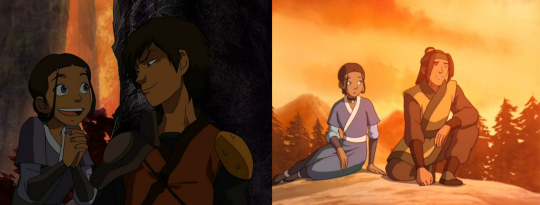
And gets a moment where the two connect over similar losses.

Except Aang.
Kataang is framed entirely from Aang's point of view.

Even when he violates her boundries.
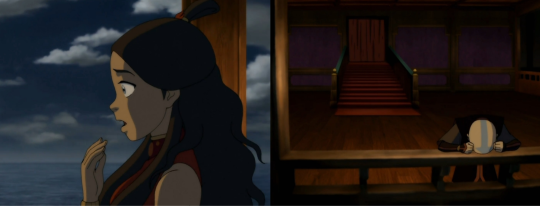
And is unable to handle Katara's grief.

But Zutara?
We get Katara's pov, and give her agency.

He saw her at her very worst, and wasn't at all hostile.

And Katara opened up to Zuko in the most significant way.
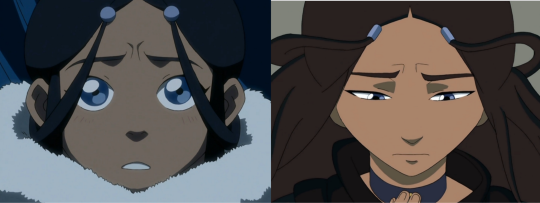
#How are they not canon#katara didn't even forgive Zuko while opening up to her#Aang had 3 books#and yet she opens up to Zuko#not her canonical love intetest#oh my god#zutara#zutara meta#anti kataang#aang critical#anti aang#anti anti zutara#kataang critical#the southern raiders#atla critical#anti bryke#bryke critical#avatar critical#pro zutara#pro zuko#zutara analysis#zutara was robbed#zutara forever#zutara evidence#katara of the southern water tribe#katara#zuko#zuko x katara#kataraxzuko#atla katara
2K notes
·
View notes
Text
I know the EIPs nonconsensual kiss is the most talked about. However, DOBS bothers me just as much. But I never see a lot of people talk about it. And I wondered why. I was talking to someone that I brought this up because it was bothering me and they told me: well, that's because Aang could have potentially died and he wanted to do something about his feelings before anything bad had happened. I begrudgingly gave into the idea, however, that kiss still bothered me. I understand that there could have been a potential where he could have died. However, that is not an excuse for out of the blue kiss someone when there has been no mention of feelings before that. Even if there were mentions of feelings that's not consent (there wasn't). Their dance in that cave is not consent. Anything that gave Aang the idea that it is ok for him to kiss Katara is not consent. His entitlement and affection for her are not consent. Just because you are going to do something life-threatening and you could die does not mean you force yourself on a person and she does not have to like it (by the look of her expression she did not look happy). She does not have to like your dying fantasy or be an object of it without her consent. Imagine, if Katara did not end up with Aang this scene would have been torn apart. But everyone's lucky that she did so it's not problematic (Sarcasm). I just hate how the scene is so normalized. Because when I watched it to write this, it was insane, Katara's dialogue "I've seen/watched you grow up, You're not this little goofy kid anymore" (it's like the writers were implying the mental age difference) drove me insane. I don't care if you say she blushed when these kinds of things happen of course you're going to get embarrassed and flustered. I have an immense amount of hatred for this scene. It was just never discussed enough. The Zutara community is the only safe place to do it.
Head Canon time (to make us feel better after this post): If Zuko ever found out about Aangs non-consensual kisses. I think Zuko would tear Aang apart.
#avatar the last airbender#katara#zutara#zuko#zuko x katara#anti aang#anti kataang#I scared myself watching that scene#katara deserved better#katara defense squad#atla critical#bryke critical#The reception on this post better be worth it
166 notes
·
View notes
Text
No, actually. It is not “shaming Katara’s femininity” or her “maternal traits” to critique the ways in which her character was relegated to a the passive role of the Avatar’s grieving widow and largely ignored by the narrative post-ATLA. Oh my god, we are not “degrading” Katara by pointing out the sexist implications of how her character was handled and to suggest such a thing is just so…infuriating and very revealing of the underlying sexism in the fandom.
No thoughts, just people endlessly glorifying Katara’s maternal tendencies without bothering to question or investigate the adverse effects of her parentification. Apparently anyone who criticizes the writing of Katara’s character is just denigrating “traditional femininity” and THEY are the true misogynists! Not the male writers or viewers who consistently minimize Katara’s significance to the narrative and mock fans who ship her with anyone other than Aang.
Not at all, really we should just accept the conditions of the narrative uncritically and never question the biases of the creators. How dare we criticize them and point out the underlying sexism in their writing?
#pro katara#atla discourse#it’s making me insane and you would not believe the fury a certain TikTok evoked from me#these people HATE HATE HATE to see any logic in the critiques provided by zutara fans because they are so blinded by their desire to consume#the show completely uncritically.#Good lord some of these fans are SO misogynistic and yet we’re the ones who get called *problematic* for shipping zutara#avatar the last airbender#avatar zuko#avatar#zutara#pro zutara#atla critical#atla#atla netflix
472 notes
·
View notes
Text
I’ve seen lots of conversation on here about Zutara shippers opinions on aang and mai and i thought I’d give my point of view.
I want to start by saying that I think there should be more of a distinction between disliking a character because they are a bad person and disliking a character because they are written badly. With that being said, I can confidently say that, with the material of the main ATLA show, I dislike Aang and Mai because they are badly written characters. Meaning, if their arcs were properly finished, I would have no problems with them. This brings me to another topic of how I don’t really ‘hate’ characters who are bad people if they’re well written but that’s a conversation for another post.
I need to point out that I didn’t start disliking Aang and Mai until they had their arcs undermined when Kataang and Maiko became canon. With the arcs they were going on, they had so much potential to be really interesting and I enjoyed their personalities.
When it comes to Aang, I had no problem with him as a character until season 3 part 2 when I started to realize that his world view (which is flawed based solely on the fact that he is young and there is no way he’s going to have a nuanced pov) was not going to be challenged. Aang should have had to give up katara. Aang should not have just had everything handed to him with the lion turtle and the pointy rock.
Then there’s the southern raiders which I would argue, if Aang’s arc had been completed, would not illicit as many conversations and arguments about it as it currently has. Because his actions in that episode make sense (Sokkas don’t really but again-that’s another story) because he’s a kid. This episode should have been a big decider of his change in worldview. The problem is that the creators decided his flaws didn’t exist and that he was perfect. (At 12 years old?!?!?)
Then there’s Mai. She’s a much smaller character but that doesn’t mean she deserves less of an arc. Mai is a character whose personality I love! (I’m all for gloomy depressed women!) There’s two ways Mai’s character could have developed, and I think both options are great, the problem is that Bryke decided to go in neither direction.
On the one hand, Mai could have been a representation of unlearning the propaganda she was taught in the fire nation throughout her whole life. I think this direction would make Maiko more believable, although I still don’t think they are a good couple because their personalities create a toxic dynamic and Mai’s story with Zuko is meant to represent that toxicity.
The second option would be to have her views not change, like we see in the show, and have her not get back together with Zuko. This is the more interesting path in my opinion because it’s more realistic. I don’t think the problem with Mai’s arc lies with her personal views of the fire nation, more so with her relationship with Zuko. As we have it in the show, Mai’s views don’t change. Therefor, it doesn’t make sense for her character or for Zuko’s for them to get back together like nothing ever happened.
When it comes down to it. Both Aang and Mai had their arcs sabotaged because the creators rejected Zutara. Even without Zuko and Katara getting together these were the wrong decisions. Both characters had potential to be well written, but in the end, the creators chose the path didn’t allow that to happen because they just couldn’t kill their darling. (Kataang)
Sorry for rambling, this is kind of just my take on the whole “Zutara shippers hate Aang and Mai” take.
#is this a meta?#atla#avatar the last airbender#anti aang#anti Mai#anti kataang#anti maiko#anti bryke#zutara#ayo fuck bryke all my homies hate bryke#atla critical#aang critical#Mai critical
183 notes
·
View notes
Text
I know people have already talked about this topic, but I want to too.

There are a lot of jokes on the Internet about how Katara constantly mentions her mother as if it were the most important event, but...
Isn't that so? I mean, in the life of a little eight-year-old girl, this is truly the most important event in her life and she wants to share it.
Katara took on the role of an adult too early, and she didn't have the opportunity to work through this problem with anyone, because she's already an adult => she cannot afford to rely on someone. But she needs it, and that's what traveling with Aang gives her: the opportunity to find children like her and share with them the burden that she has been carrying all this time. Note that Haru, Jet, and even Zuko are people who not only have experienced loss, but also have some kind of responsibility for others: for their family or even for a group of people. She doesn't tell adults about this because she isn't looking for care, she's looking for understanding of her feelings.
The problem is that it's not enough for her. Her sadness turns to rage because the further the story goes, the less satisfied Katara becomes.
The closer the heroes get to the end of the war, the more angry Katara gets: first at her father, then more specifically at Zuko. And, in the end, she finds the cause of this anger, as well as the opportunity to satisfy the thirst for understanding of her grief - the murderer of her mother. She needed revenge not just because it was fair, but because from the very beginning of the series, Katara was looking for an opportunity to calm those feelings that were rushing out. And her attempts to do this by expressing the problem were not enough. She needed more, and she got it by facing the biggest monster in her life.
In general, the “monster” metaphor obviously speaks not only about Yon Ra, but also about Katara herself. Or rather about her anger. Judge for yourself: she had to restrain a storm of emotions from the age of eight; she began to reveal her grief only in the first season, that is, at the age of 14. She ignored her pain, pushing it deep inside until it became a raging monster rushing out. And what Katara really needed was to face it. So when she flies to find Yon Ra, she also finally meets the version of herself that she has carefully ignored and hidden for the benefit of others.
It's funny that Zuko is the one who helps her. In general, it was his complete understanding of Katara in this matter that amazed me. He, like no one else, knows what it’s like to face your inner demons and knows how useful it is for knowing yourself. And how dangerous it is when you're alone in it. So he accompanies her to keep her safe. So that she has a person on her side who will be there, no matter what choice she makes. He will support anyone. (I'm crying because of how beautiful it is wasgffv💖)
(A small antikataang insert: this is the reason why their relationship doesn't work. Aang only supports the right decisions, even if they require Katara to sacrifice inner harmony, while Zuko will simply support her for whatever choice she makes. It's funny because Aang has to keep balance and as a monk he knows a lot about that. The show focuses heavily on the theme of yin and yang, that is, the balance of good and evil. In order to achieve internal balance, Katara needed to turn to internal evil, because she tilted this scale towards good. She was imbalanced to begin with, and instead of understanding this, Aang insisted on continuing the preponderance of good. It’s as if he doesn’t understand that the preponderance of good is as bad as the preponderance of evil, and this will only harm Katara. I hope my point is clear)
Finally, Katara finds inner peace when she faced everything that was raging inside her, when she did what she needed and poured out everything she ever wanted. Every word about her mother led us to this moment, as did Katara herself.
And do you know what the point is? Why am I telling all this? It's all a character arc that unfolds linearly over three seasons.
Now think back to the arc of Aang, the main character of the show, in relation to his family. Did he bring them up in seasons two and three in a way that was linear? I mean, the one who constantly grieves over his father's death should have been Aang, because he learned the pain of loss so recently, he didn't have a chance to get used to it. But even in the episode SR, Aang compares the loss of mother not to the loss of his mentor and father, but to the loss of Appa and his people. It’s as if he doesn’t care about the individual connection with Gyatso and it’s nominal.
Katara, on the other hand, has emotions that she smoothly carries throughout the show and resolves in it. She has a huge number of Chekhov's guns, which each fire at its own time. Her feelings about her mother, the development of these emotions and their resolution are the most beautiful thing about this show along with Zuko's arc (even though I have problems with him in book 3).
And making derogatory jokes about it like Katara is whining and annoying is blasphemy. After all, she's the only one of the Gaang who has a single development arc throughout all three seasons, this must be respected
#atla#atla critical#avatar the last airbender#atla meta#anti kataang#anti aang#katara#zuko#zutara#katara supremacy#katara is the real main character change my mind#katara deserved better#katara meta#southern raiders
347 notes
·
View notes
Note
I hate when people say(*writers*) when zuko is an emo bad boy. When zuko acts "emo" and "badboy" as they say it's him reacting to his trauma and abuse as a kid(most of time. Zuko is still badass. But badboy no). Is it an excuse? No. But when zuko is acting that way in canon, his obsession with honor, his yelling, his moodiness, his short temper. That is the product of having his empathy literally beaten/burned out of him by his father(and mocked and emotionally abused by Azula). The reason Zuko is doing this whole thing is because he wants to please his father. Become someone he's not. His struggle of who his father wants to be with who he is. It's because of the abuse of his father and his family. As the series goes on you get more and more flashes of the person Zuko was and the person he can become. By the end of the series it's such a great contrast and Zuko is much more happier because he's with the gaang. His family. He got out of that abusive situation he was in and finally became himself. A dorky, empathetic, caring, skilled swords men, a balanced person. Does he still have moments of anger? Yes. But over all Zuko becomes a fully balanced person.
gasp! but if we don't call zuko a bad boy, however will we make sure people don't get any ideas about shipping him with katara?
jokes aside, you're absolutely right and i roll my eyes so hard when people point to bad things zuko did, or his behaviour pre-redemption as indisputable proof of the kind of person he'd be post-redemption. like you said, a lot of zuko's actions and mannerisms before day of black sun is a direct result of the trauma he suffered, and though that doesn't excuse him - and neither does the show allow it to - discounting it entirely is to erase the abuse zuko endured and how that shaped him.
using the first half of book 3 as evidence of zuko being a supposed bad boy irks me in particular because a) the narrative makes it pretty clear that this is zuko as the worst version of himself, the opposite of everything he actually is and could be, and b) he is stuck in an abusive household at the mercy of his abusers, in an actively life-threatening situation.
zuko knows that he is in a situation where he has no real agency, freedom or control. he knows that aang is alive, that azula has turned him into a scapegoat and that his life will be forfeit if his father finds out the truth. that is an incredibly terrifying and stressful situation to be put in and it's worsened by the fact that he can't even admit it - not just because doing so would mean accepting that he gave up everything that actually mattered in the catacombs to gain nothing in return, but also because no one around him will allow him to do so.
his girlfriend can't understand his experiences or his turmoil and doesn't seem to particularly want to, brushing off his anxieties and encouraging him to stay the course. he is manipulated by his father and gaslighted by his sister, aware deep down that he is entirely under their control and that they have a vested interest in keeping him helpless, yet forced to pretend as though nothing is wrong. he is isolated from the one person who could help - his uncle - physically and emotionally, both because visiting iroh puts zuko in danger, and because zuko's choices have created a rift in their relationship.
all of this compounds the psychological stress zuko is experiencing, forcing him into a constant state of fight-or-flight, and this context is vital to understanding many of the decisions he makes and how he behaves in the first half of book 3.
(this is why i don't agree with the take that hiring combustion man is an ooc moment for zuko because even though i think the idea of combustion man himself is stupid - not to mention disrespectful to the hindu origins it's pulling from - it's a fundamentally desperate move, and zuko at this point is more desperate than he's ever been.)
that's why it's unlikely that zuko post-redemption would behave similarly since many of the factors that contributed to his anger, hostility and moodiness would no longer exist! judging zuko's future behaviour based on a time when he was constantly abused, gaslighted and threatened is just not an accurate or fair means of measurement, especially since we know what he's like at his best. the zuko we see with the gaang still has a bit of a short fuse, sure, but he's also sincere, honest, awkward, shy and far happier than he's ever been. because shocker, people tend not to act the same way in healthy, supportive environments as they do in abusive, traumatic ones. who would've thought?
people who make this argument also usually tend to compare zuko to aang, especially to glorify how aang remains cheerful and peaceful despite his trauma, and... no. just no. first of all, the show barely gives a fuck about developing aang's trauma the way it does zuko's so of course it seems to affect him less, and secondly, there's something to be said about how trauma responses like aang's are a lot more palatable and comfortable for audiences than responses like zuko's, or even katara's in the southern raiders.
anger or moodiness, or wanting to punish the people who hurt you, are not inherently wrong ways to react when you've been wronged and traumatized. praising aang for remaining cheerful and forgiving while calling zuko a bad boy for being angry and moody implies a sense of moral superiority that comes with reacting to trauma in the "right" way, which is both inaccurate and insensitive.
zuko will never be aang, and that's fine. he doesn't have to be. he ends the show reclaiming everything his abusers tried to take from him, having found himself and his destiny, in a place of healing that is all his own. that is an incredibly meaningful and powerful narrative, and the last thing zuko deserves is to have all of his complexity and development stripped just to be reduced to the tired trope of a "bad boy" when he was never one in the first place.
176 notes
·
View notes